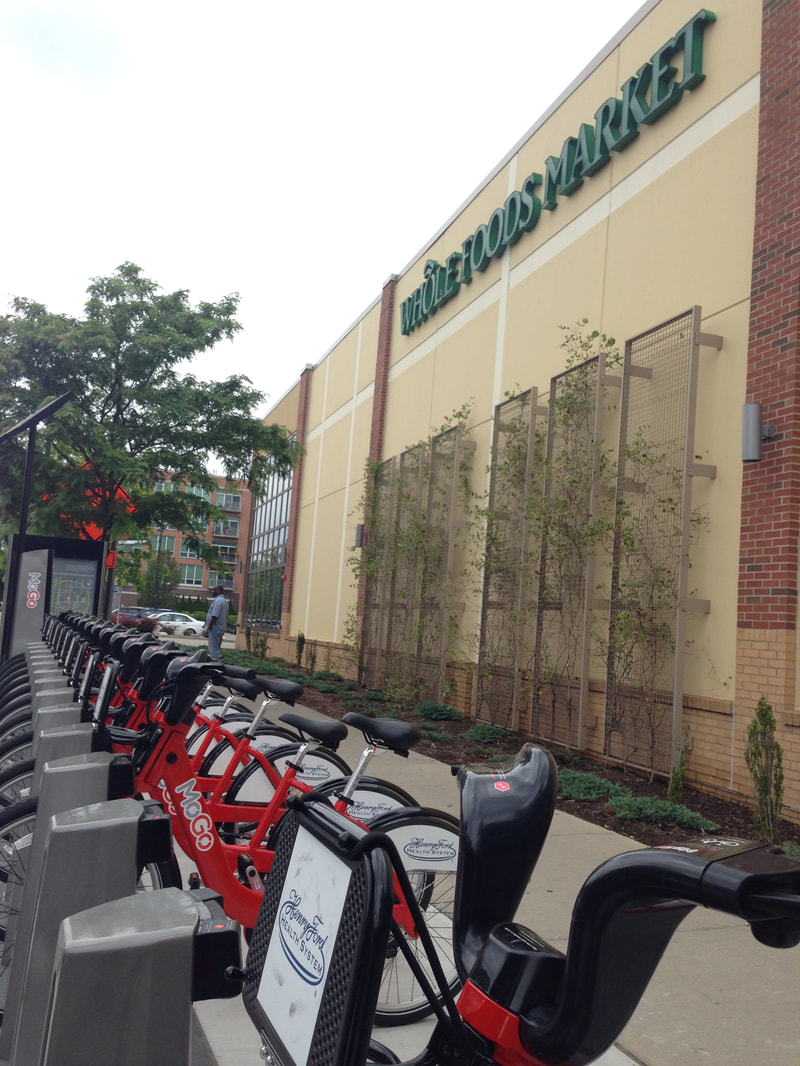At MoGo, the main project Thomas and I have been working on is an evaluation plan. Working to identify and sort through the possible metrics and data MoGo should focus on evaluating at the end of the year for their first annual report fits into MoGo’s larger goals of building an efficient and inclusive bike share program. In the first few weeks, we quickly became aware of the importance MoGo attributes to building authenticity as a non-profit in Detroit. Not only appearing as an organization for the benefit of businessmen and women of the downtown area, but one that is accessible to all Detroiters is a core element of the organization. MoGo’s main goal is to bring social value, in this case a new mobility option, as well as health and happiness to as many people as possible. I perceive our evaluation plan as being a framework to assess how Lisa, Rory and Adriel are working towards this goal and to help them identify areas for improvement.
A bike share program was not self-evident or intuitive for the motor-city of Detroit and it took a lot of convincing to get it in place, but the hard work still continues to encourage increasingly more people to embrace it. Our project is a way of identifying how it is transforming Detroit as well as how it could do so even more. By transforming I mean increasing the number of bikers, but also encouraging the City to create more bike lanes. A more bike-friendly Detroit will induce fewer cars, less congestion, less stress and cleaner air. As the Danish city planner in my favorite environmental documentary Demain explained, if you create spaces in which people can bike or walk, they will do so. This also means that people will spend less time in their cars and more time talking to people in the streets, enhancing social interactions and favoring inclusion.
Throughout our time at MoGo we have also worked in tandem (no bicycle pun intended) with Rory, the Program and Access Manager, to create materials, such as feedback surveys and intercept surveys, to document MoGo’s outreach initiatives and people’s interactions with them. In my opinion, this is important work to understand how MoGo is being perceived and how they can continue working towards its acceptance even more effectively. I also have been working on collaborating with urban farming groups. I have been using my connection to farming, working at the Duke Campus Farm, to reach out to MUFI (The Michigan Urban Farming Initiative) and I am currently working on organizing a MoGo info session at the MUFI farm. This not only extends the knowledge of MoGo to more people, but also builds a new force in Detroit: a cohesive environmentalism. I believe that if you can bring mobility and urban farming together, you have the potential to create a more complete concept of the environmental Detroiter.
Photo: The new MoGo station Mack/John R in front of Whole Foods highly anticipated by several avid MoGo users we surveyed! :)
A bike share program was not self-evident or intuitive for the motor-city of Detroit and it took a lot of convincing to get it in place, but the hard work still continues to encourage increasingly more people to embrace it. Our project is a way of identifying how it is transforming Detroit as well as how it could do so even more. By transforming I mean increasing the number of bikers, but also encouraging the City to create more bike lanes. A more bike-friendly Detroit will induce fewer cars, less congestion, less stress and cleaner air. As the Danish city planner in my favorite environmental documentary Demain explained, if you create spaces in which people can bike or walk, they will do so. This also means that people will spend less time in their cars and more time talking to people in the streets, enhancing social interactions and favoring inclusion.
Throughout our time at MoGo we have also worked in tandem (no bicycle pun intended) with Rory, the Program and Access Manager, to create materials, such as feedback surveys and intercept surveys, to document MoGo’s outreach initiatives and people’s interactions with them. In my opinion, this is important work to understand how MoGo is being perceived and how they can continue working towards its acceptance even more effectively. I also have been working on collaborating with urban farming groups. I have been using my connection to farming, working at the Duke Campus Farm, to reach out to MUFI (The Michigan Urban Farming Initiative) and I am currently working on organizing a MoGo info session at the MUFI farm. This not only extends the knowledge of MoGo to more people, but also builds a new force in Detroit: a cohesive environmentalism. I believe that if you can bring mobility and urban farming together, you have the potential to create a more complete concept of the environmental Detroiter.
Photo: The new MoGo station Mack/John R in front of Whole Foods highly anticipated by several avid MoGo users we surveyed! :)

 RSS Feed
RSS Feed
